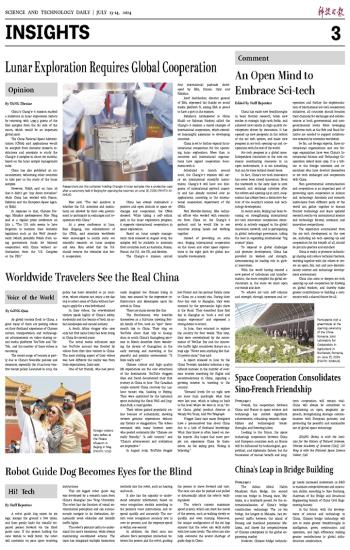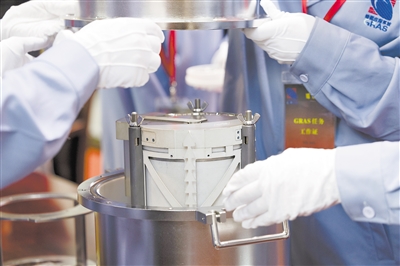
 |
| Researchers put the container holding Chang'e-6 lunar samples into a protective case after a ceremony held in Beijing for opening the returner, on June 26, 2024. (PHOTO: XINHUA) |
China's Chang'e-6 mission marked a milestone in lunar exploration history by returning with 1,935.5 grams of the first samples from the far side of the moon, which would be an important global asset.
The China National Space Administration (CNSA) said applications would be accepted from domestic research institutions and scientists to study the Chang'e-6 samples in about six months, based on the lunar sample management rules.
China has also published an announcement, welcoming other countries to take part in the study of the lunar samples.
However, NASA said on June 28 that it didn't get "any direct invitation" while China has worked with France, Pakistan and the European Space Agency (ESA).
In response to that, Chinese Foreign Ministry spokesperson Mao Ning said at a regular press conference on July 1, "The U.S. side seems to have forgotten to mention their domestic legislation such as the Wolf Amendment (which prohibits NASA from using government funds for bilateral cooperation with China without authorization from the U.S. Congress or the FBI)."
Mao said, "The real question is whether the U.S. scientists and institutions are allowed by their own government to participate in exchanges and cooperation with China."
At a press conference in June, Bian Zhigang, vice administrator of the CNSA, said scientists worldwide were encouraged to jointly carry out scientific research on lunar samples and data. Bian added that the U.S. should remove the obstacles that limit cooperation.
China has always maintained a positive and open attitude to space exchanges and cooperation, the CNSA stressed. While taking a self-reliant path in the lunar exploration program, it supports international cooperation in space exploration.
Based on lunar sample management rules released in August 2023, the samples will be available to scientists from countries such as Australia, Russia, France, the U.S., the UK, and Sweden.
The Chang'e-6 mission carried four international payloads developed by ESA, France, Italy and Pakistan.
Josef Aschbacher, director general of ESA, expressed his thanks on social media platform X, saying ESA is proud to have a part in the mission.
Pakistan's Ambassador to China Khalil-ur-Rahman Hashmi called the Chang'e-6 mission a model example of international cooperation, which extended meaningful assistance to developing countries.
China is set to further expand its international cooperation for the upcoming lunar exploration. More than 10 countries and international organizations have signed cooperation documents with it.
Scheduled to launch around 2026, the Chang'e-7 mission will carry six international scientific instruments. Chang'e-8 will have 200 kilograms of international payload capacity and has already received over 30 applications, according to the international cooperation department of the CNSA.
Neil Melville-Kenney, ESA technical officer who worked with researchers from China on the Chang'e-6 payload, said he would like to see countries joining hands and working together.
Instead of provoking an arms race, forging international cooperation on the moon and other space explorations is the right path for global sustainable development.


 Next
Next




